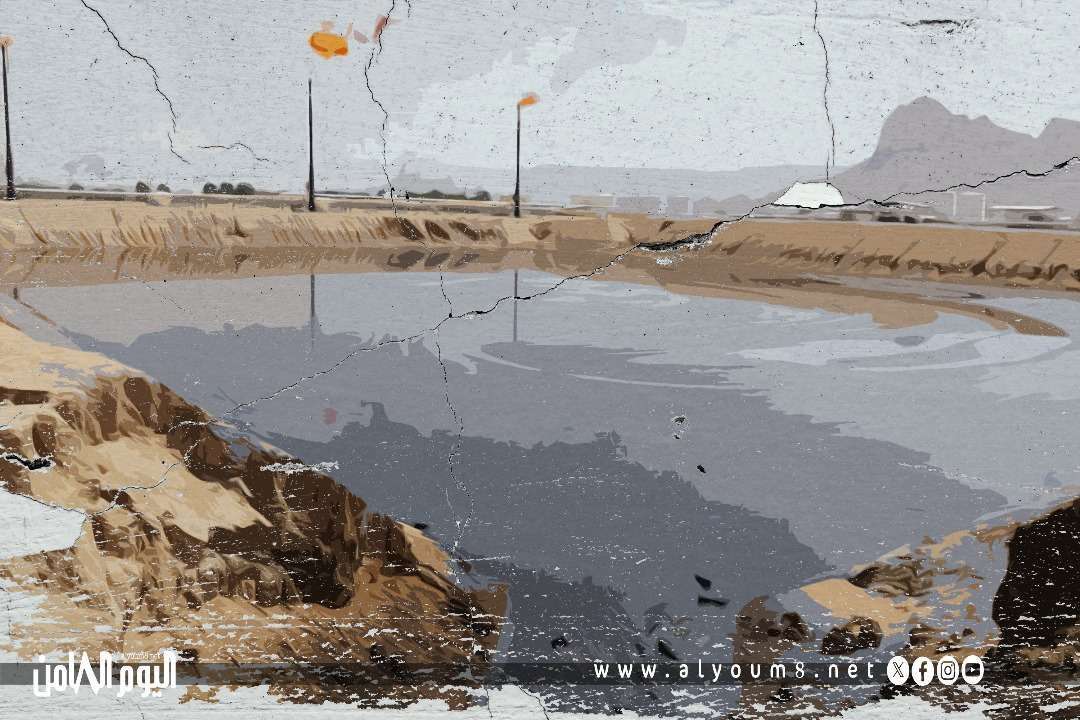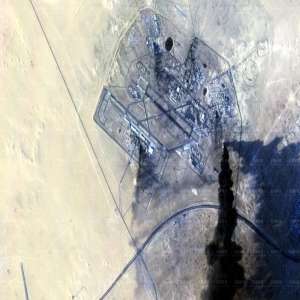"Systematic destruction of the environment and international arbitration".
?Report: How Soft Censorship and the War in Yemen Have Thwarted the Oil Pollution Accountability Effort
An unpublished report commissioned by the Yemeni parliament describes 30 environmental pollution incidents by more than 12 oil and gas exploration companies and their affiliates The report, which has been shelved since the outbreak of war in Yemen, accuses Canada's Nexin of "reckless and deliberate negligence in polluting the environment with oil liquids."

Calvale site in Al-Khashaa area of Hadramout Governorate (Transnational Crime and Corruption Reporting Project (OCRP)
When oil rigs arrived in central Yemen three decades ago, Sheikh Salem Saeed bin Hawtli's tribe did not anticipate what would have happened. "Otherwise, we would have protected ourselves," the tribal leader, who lives in an agricultural area surrounded by oil wells, said in an interview with reporters.
Over the years, he recalls, he has seen foreign oil company workers dump barrels of what appear to be drilling waste into open sand barriers near where his tribe lives.
He recalled how birds used to come and drink water. But when it started to die, the company erected a fence around the sand pits, but that did little to prevent heavy rains from washing away the contents down the valley down to the Rseb area, where the Bin Hotli tribe lives in the heart of one of the country's oil-producing regions.
Ben Hotly told the OCCRP Transnational Organized Crime and Corruption Reporting Project that "when torrential floods come, we see blackness in the water that looks like oil."
Like other tribes living near Yemen's oil fields, his tribe has paid a heavy price while private and public oil extraction companies have made billions of dollars. Since the discovery of oil in Yemen in the eighties, attempts at accountability have stalled due to war and the fragmentation of political power.
An unpublished report commissioned by the Yemeni parliament at the end of 2014 documents more than 30 environmental violations committed by dozens of oil and gas companies between the boom days of the early 2000s until the country's slide into civil war in 2014. Interviews conducted by the investigative team with local residents, experts and officials, as well as a review of court records and other reports related to oil and gas extraction, provide a similar picture of these practices.
The report was delivered to lawmakers at the end of 2014 when the country began to descend into civil war. The report has since been locked in listing, while many oil companies have left the country as security deteriorates. OCCRP reports show that state companies that took over the industry from foreign companies are now accused of continuing the destruction. In one case, the former head of Yemen's Environmental Protection Authority, Dr. Abdulqader al-Kharraz, sues a government company for ongoing health impacts on people in the region.
Dirham Abu Hatem, director general of environment and safety at Yemen's Ministry of Oil and Minerals, told OCCRP, "When companies drill in any country of the world, they have regulations and fear for their reputation. But when they operate in a state of law, then companies take their rest," especially since at the time there were also no regulations and controls to regulate the environmental impact of exploration.
The 147-page report was written by Dr. Mohammed Al-Haifi, Associate Professor of Environment at Sana'a University and reviewed by Eng. Ali Abdullah Al-Dhubhani, Director General of Chemical Safety and Hazardous Waste at the Ministry of Water and Environment. They were appointed by parliament amid growing complaints of irregularities in the oil and gas extraction sector. According to photographs and analyses of water and air samples, inspections and citizen complaints, the report describes incidents involving more than a dozen international oil companies, as well as local companies and contractors.
For example, Canadian oil company Nexin – which until 2015 operated near the Ben Hotli tribe – is accused of "reckless and deliberate negligence in polluting the environment with drilling fluids," according to the parliamentary report.
The report concluded that the scale and frequency of pollution "indicate a deliberate determination to commit crimes against the environment."
Images taken by the OCCRP team of journalists at the end of 2021 of Nexin rig sites near where Ben Hotli lives, an area known as Sector 51, shows large amounts of dark liquids gathering among the desert sands. Nexin was purchased by Chinese CNOOC in 2015.
Source: Assessment of the environmental, health and social status of pollution caused by the oil and gas sector in the governorates of Hadramawt and Marib in the Republic of Yemen - a study submitted to the Environment and Health Committee of the House of Representatives
Dr. Gigman, who monitored the work of oil companies during his tenure at the ministry, said in an interview with OCCRP that Nexin was negligent about the method of disposal or treatment of drilling fluids. "Nexin was not alone, but even other companies operating in Yemen," he added.
Ali al-Dhubhani, the former head of hazardous waste management at the Ministry of Environment, who reviewed the report before submitting it to parliament, told OCCRP that the report not only shows the "recklessness and negligence" of oil companies, but also the failure of Yemeni authorities to properly implement the instructions.
According to Yasmine al-Iryani, executive director of knowledge production at the Sana'a Center for Strategic Studies, who highlighted the challenges of the oil sector in a 2020 study, the outbreak of civil war in Yemen has further hampered efforts to reform the sector. "Today, conditions have become more difficult for the enactment of accountability mechanisms," al-Iryani told OCCRP.
After supporting the Yemeni government's budget for decades, oil profits are now a source of income for the country's warring factions. Citizens like Sheikh al-Hotali are still living with these repercussions. Like many in the region, Sheikh Bin Hawtali blames oil pollution for low crop yields in his region and rising diseases such as cancer and kidney disease.
"Our land has never been like this. It was fruitful and now it is barren and useless."
The Ministry of Oil and Minerals did not respond to questions sent by the team of investigative journalists about what they had documented and revealed.
Officials who have tried to hold companies accountable say they have been silenced.
A former head of Yemen's environmental protection agency said he was targeted after challenging state-run E&P Safer over its track record, and has since filed a lawsuit against the company and fled the country. Another senior EPA's official said he was also fired last year after challenging oil companies and authorities.
Sector 14
After the discovery of oil in Yemen in the mid-eighties of the twentieth century, a group of foreign companies flocked to the country to obtain concession areas that the government divided into "sectors" under production sharing agreements that granted companies oil exploration rights on the condition that they share royalties with the state.
At the peak of production in the early 2000s, Yemen was pumping 450,000 barrels per day. Before the outbreak of the war, oil and gas revenues accounted for about 70 percent of the state budget.
Formerly known as Canada's Occidental Petroleum, Nexin was one of the first companies to find oil in 1991. By the early 2000s, it was running two sectors in Hadramawt Governorate. It wasn't long before locals began to feel the effects of her work.
The parliamentary report details how an estimated 450,000 barrels of oily water slipped in March 2008 from a discharge well in the main Nexin concession area, Sector 14, where it spilled for approximately three kilometers.
Tribal leader Omar Saeed Baabbad remembers the leak. Baabbad, 75, said in an interview with OCCRP during a visit to the area that contaminated water continued to flow for four days, covering many farms in the area. "The earth is never the same... We used to produce 40 to 50 bags of wheat per season. Now we only produce 10 and buy the rest." The report's authors describe water as "companion water": a liquid pumped to the surface alongside oil and often contaminated with hazardous chemicals, some of which are radioactive.
The report noted that businesses across Hadramawt committed "flagrant environmental violations" when disposing of this type of waste.
The produced water can be disposed of by re-injecting it back into the basin from which it came, but this must be done carefully to avoid contaminating the groundwater sources, explained Dr. Jugman, a geologist expert. The risk is particularly acute in Hadramawt, which sits on top of Yemen's largest aquifer.
"The water produced is toxic and cannot be used for humans or agriculture unless it undergoes significant treatment, which oil companies avoid because it is an expensive process," Dr. Jagman said.
After Nexen left Sector 14 in 2011, the state-run company that acquired Sector found that site in disarray, according to an international arbitration case filed by Yemen's Ministry of Oil and Minerals against the Canadian company and its partners in Paris two years after it left Yemen. The Commercial Court specializes in settling commercial disputes.
Yemen accused companies of carelessly re-injecting associated water and failing to monitor whether the companies had contaminated the groundwater. Nexin admitted during the arbitration that she pumped polluted water down the freshwater aquifer for five years in the nineties, but said she did not cause any environmental damage.
The ministry also described in its pleadings that it had found hazardous and missing wells, waste dumped or burned in the open, and broken waste incinerators that had not been repaired for years. Although Yemen's environmental laws were weak at the time, the Ministry of Oil argued in the First International Court of Arbitration that Nixen and its partners failed to meet the basic criteria set out in its contract.
While some of the charges were dismissed — on the grounds that the allegation of pollution with produced water was deemed outside the statute of limitations — the court ordered Nexin to pay nearly $10 million in fines to replace a broken incinerator and other equipment that was no longer effective, as well as an environmental impact assessment study that the company did not do before leaving the industry in which it operated.
For Yemenis living near the country's oil fields, the impact of pollution can be measured in more than dollars. Scientific studies have shown that living near oil fields is associated with an increased risk of certain cancers.
Data from the Hadhramaut Cancer Foundation – the region where Nexin operated – shows that cancer cases almost tripled between early 2000 and 2015. Its director, Dr. Walid Abdullah al-Batati, said that although there are no studies proving that oil pollution caused the numbers to rise, areas near oil blocks "have the highest rates of cancer compared to other provinces."
Baabbad, a tribal leader whose land has been contaminated, blames oil pollution for the cancer that killed his brother a few years ago.
He told reporters in an interview at his home: "Our health and all our land have been destroyed because of the oil companies."
Sector 18
In Yemen's other major oil-producing region, about 30 kilometers from Marib city, is Sector 18, where the Dallas-based Hunt Oil Company in the USA discovered Yemen's first oil in 1984.
The parliamentary report describes various abuses during Hunt's 20-year tenure that included the emission of dangerous levels of nitrogen oxides into the air to the improper storage of hundreds of barrels of expired chemicals.
Hunt was also found to have buried chemicals in a pit in the desert alongside drilling waste, and allegedly tried to bury "a significant amount of drilling waste" at another site before local officials stopped it halfway. Hunt's firm declined to comment on the report.
Hunt exited Sector 18 in 2005 after Parliament refused to renew the concession contract. But the state-run Safer Exploration and Production Company (SEPOC) that acquired it is accused of continuing Hunt's legacy.
Square: A Devastating Legacy
In 2018, Dr. Abdulqader Al-Kharraz, who was then the head of the Environmental Protection Authority of Yemen Environment, received a complaint that the state company Safer buried hazardous chemical waste from one of its processing units in the desert. Less than a year later, the same authority received another complaint that the company was storing chemicals improperly, making them vulnerable to weathering, in a threat to the surrounding area.
After his multiple efforts to obtain cooperation from SAFER failed, Dr. Al-Kharraz filed a lawsuit in 2020 accusing the company of burying hazardous chemicals and drilling waste, and demanding compensation on behalf of dozens of cancer patients.
Dr. Al-Kharraz supports his claims before the court with results by analyzing 65 soil samples he took from various landfill sites in Sector 18 managed by Safer and two neighboring sectors over several years. Laboratory tests revealed that they contain volatile hydrocarbon molecules and cancer-causing metals such as chromium, copper, nickel and lead at levels above permissible international limits.
In one sample, the lead level was more than 120 times higher than the international standard used in the laboratory, while zinc was 32 times higher.
Al-Kharraz also distributed a 2020 questionnaire to a random sample of 51 people in Harib, a city near the strip from which he sampled, and found that nearly two-thirds of them suffer from cancer and more than 17 percent suffer from chest and respiratory diseases. The incidence of brain cancer was higher among children, it was documented.
In statements to OCCRP, Safer denied burying any hazardous materials at the site or violating Yemen's environmental law, which punishes deliberate pollution that harms the environment with up to 10 years in prison. Safer's spokesman declined to comment on Dr. Kharraz's lawsuit, which remains stalled in the court.
The company said that since taking over Sector 18, it has taken measures to protect the environment, such as lining waste pits and protecting water supply through better reinforcement of underground pipes.
Oil industry "red line"
The legal proceedings taken by Dr. Al-Kharraz against Safer in the courts have been stalled since 2020, with the company's lawyers challenging the technical details while the original judge in the case stepped down that year, and other judges refused to reopen the case.
At the same time, Dr. Al-Kharraz said he was met with a campaign of intimidation.
In September 2019, a few months after submitting his second complaint to Safer, Dr. Al-Kharraz was replaced as the head of the Environmental Protection Authority.
When Dr. Al-Kharraz filed the case against Safer the following year, the company's lawyer asked the prosecution to investigate him for breaching the peace and harming the public interest.
At some point in the litigation, Dr. Al-Kharraz sought protection after Safer's lawyer told the court that locals had offered the company to prevent him from filing a case against the oil company. Dr. Al-Kharraz said he viewed the comments as a threat.
Dr. Al-Kharraz says he eventually fled Yemen after threats against him escalated. The threats began as "advice" from friends and then evolved into verbal intimidation, including from a government official who spoke to his father. Dr. Al-Kharraz believes that the incident of bombing the family's homes in Marib with tank rockets on December 9, 2021, a month after he left the country, "is an implementation of the threats he is facing because of what he revealed about oil resources the case he filed against oil companies related to oil pollution and his demand to stop the burial of hazardous waste and treat cancer patients in the region and compensate them" although OCCRP did not find any evidence to confirm this.
A video filmed at al-Kharraz bats shows army commanders in Marib governorate visiting the Diwan after reaching a tribal reconciliation with family elders coupled with compensation for losses. A spokesman for the commander of the 14th Brigade of the internationally recognized government denied Dr. al-Kharraz's claims that the bombing of the family's homes "was on orders that reached the local leadership from within the state."
The spokesman told OCCRP that "everything you mentioned in your letter is untrue. The case of Brother Muhammad Al-Kharraz was arbitrated under the supervision of tribal faces, and Brother Muhammad Al-Kharraz was compensated with what he was sentenced to and he waived the case with his consent and after receiving the compensation and wrote that he did not have any lawsuit or request left in the judgment we have.
Dr. Al-Kharraz, who now spends most of his time moving between several Arab and foreign countries, said: "Influential people in the government and oil companies protect their interests by preventing effective scrutiny of the oil extraction sector."
Mohammed Salem Mujawar, director of the office of the Environmental Protection Authority in oil-rich Shabwa province, said he was also removed from the job after trying to detect pollution in his area.
In 2020, his office began documenting pollution carried out by foreign and domestic oil companies operating in the area. These violations included the failure to stop and properly address the frequent and large-scale oil spillage from a pipeline operated by the state-run Yemen Oil and Mineral Investments Company.
The company did not respond to OCCRP's request for comment.
Mujawar wrote in a public statement published in April 2022, "We were quickly warned by some authorities of the seriousness of this file because it remained for previous years a 'red line' away from oversight because the oil sectors are linked to influential forces that control them and protect those companies operating in them."
Two months later, Majwar wrote two letters to the governor of the region alleging that his envoy had instructed the Environmental Protection Public Authority not to take legal action against oil companies or damage their reputation. Later that month, Major was disqualified.
The Shabwa governor's office did not respond to repeated requests for comment.
Majwar highlighted a copy of the unfair dismissal complaint he filed with Yemen's Human Rights Commission. UNHCR confirmed receipt of the complaint but gave no further details. In an interview with OCCP in March, Major said the oil pollution problem had not yet been resolved. "Contaminated soil is still there and when it rains it sweeps away the soil for agricultural areas."
Companies return to Yemen
Although the majority of foreign oil exploration companies operating in Yemen left after the war began or halted production due to security challenges, some have returned to work. In October 2021, local journalists working with OCCRP on this investigative journalism visited Sector 9 area in Hadramawt, where operations were then managed by Calvale Petroleum Cyprus.
Sheikh Abdullah Mubarak bin Badr, who lives in an area close to the company's scope of work, said that "when it rains, black matter accumulates under the palm trees." Months ago, floods washed away this contaminated water from the oil site into the valley.
A Calvalli spokesman acknowledged the incident and said the company had paid compensation through a formal government-led process to residents affected by the leak, which came from open potholes flooded with heavy rain. The spokesman said the accident was due to an "exceptional flood".
During the visit, journalists saw a separate earthen pit for produced water inside the Calvalli site and lacking any lining. The contents of the pit flowed into the surrounding ground through a skylight in a collapsed wall.
The company spokesman said the pond was built before a 2010 regulation that now requires protective layers for produced water and has nothing to do with the latest leak. Calvalli's plans to repair the crater had been disrupted by the war, he added.
"This will be done once the company can restore production and the security situation in Yemen allows international service companies to return to Yemen," the spokesman said.



